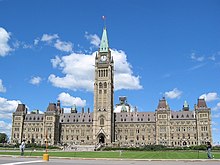Criminal Code (Canada)
| Criminal Code | |
|---|---|
 |
|
| An Act respecting the Criminal Law | |
| Citation | RSC 1985, c C-46 |
| Enacted by | Parliament of Canada |
| Date enacted | First enacted: SC 1892, c 29; carried forward in statute revisions, RSC 1906, c 146 and RSC 1927, c 36; substantially revised and re-enacted, SC 1953-54, c 51; carried forward in statute revisions, RSC 1970, c C-34 and RSC 1985, c C-46 |
The Criminal Code or Code criminel is a law that codifies most criminal offences and procedures in Canada. Its official long title is "An Act respecting the criminal law" (R.S.C. 1985, c. C-46, as amended). Section 91(27) of the Constitution Act, 1867 establishes the sole jurisdiction of Parliament over criminal law in Canada.
The Criminal Code contains some defences, but most are part of the common law rather than statute. Important Canadian criminal laws not forming part of the code include the Firearms Act, the Controlled Drugs and Substances Act, the Canada Evidence Act, the Food and Drugs Act, the Youth Criminal Justice Act and the Contraventions Act.
One of the conveniences of the criminal code was that it constituted the principle that no person would be able to be convicted of a crime unless otherwise specifically outlined and stated in a statute. This legal document has played a major part in Canada's history and has also helped form other legal acts and laws, For example the Controlled Drugs and Substances Act.
The Criminal Code was first enacted in July 1892 after being a pet project of the Minister of Justice of the time, Sir John Sparrow David Thompson. It was based on a drafted code called "the Stephen Code", written by Sir James Fitzjames Stephen as part of a Royal Commission in England in 1879, and influenced by the writings of Canadian Jurist George Burbidge. Canada's criminal code followed much of England's 1878 bill. However Canada wanted to have a more precise legal document that outlined all criminal laws.
...
Wikipedia
